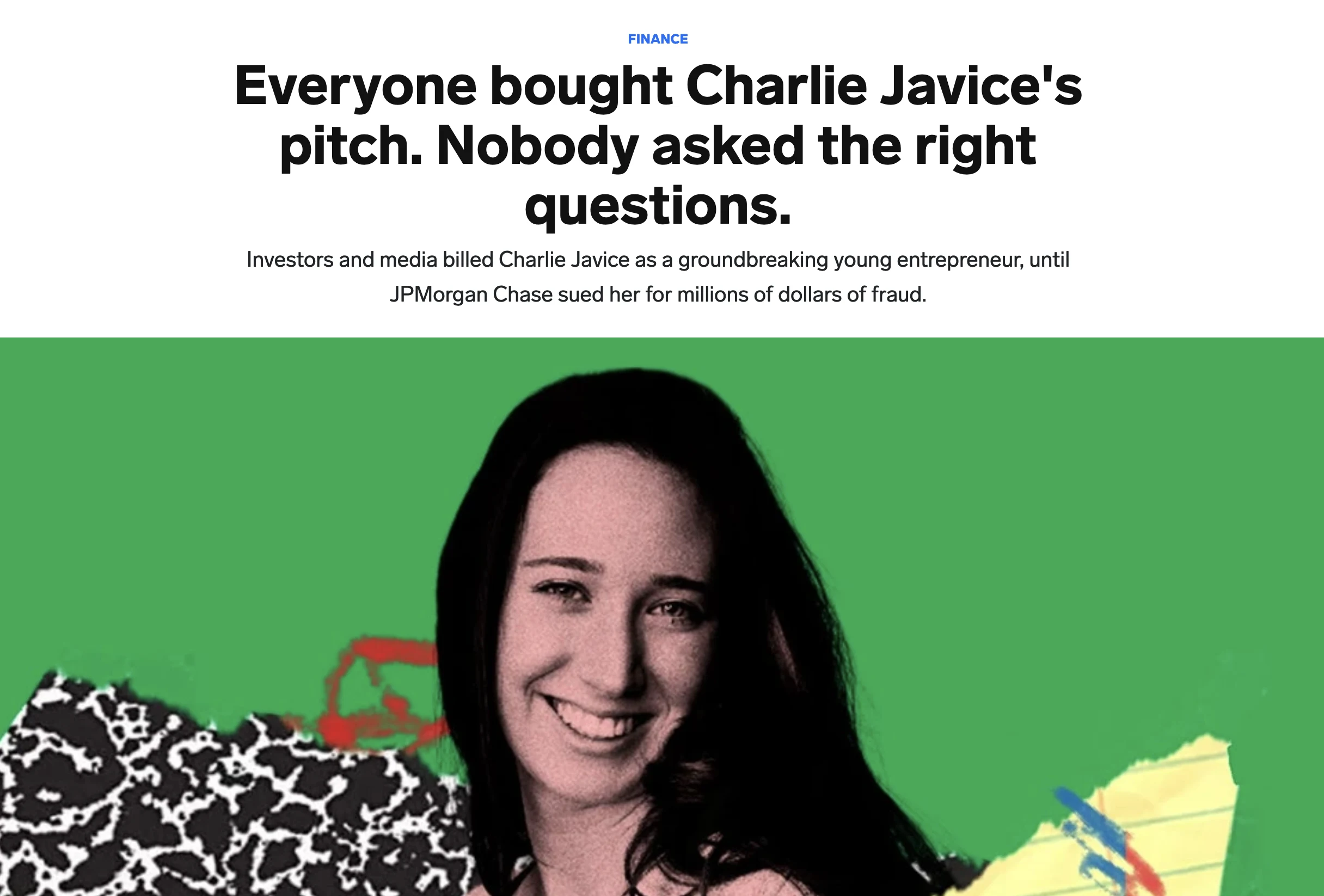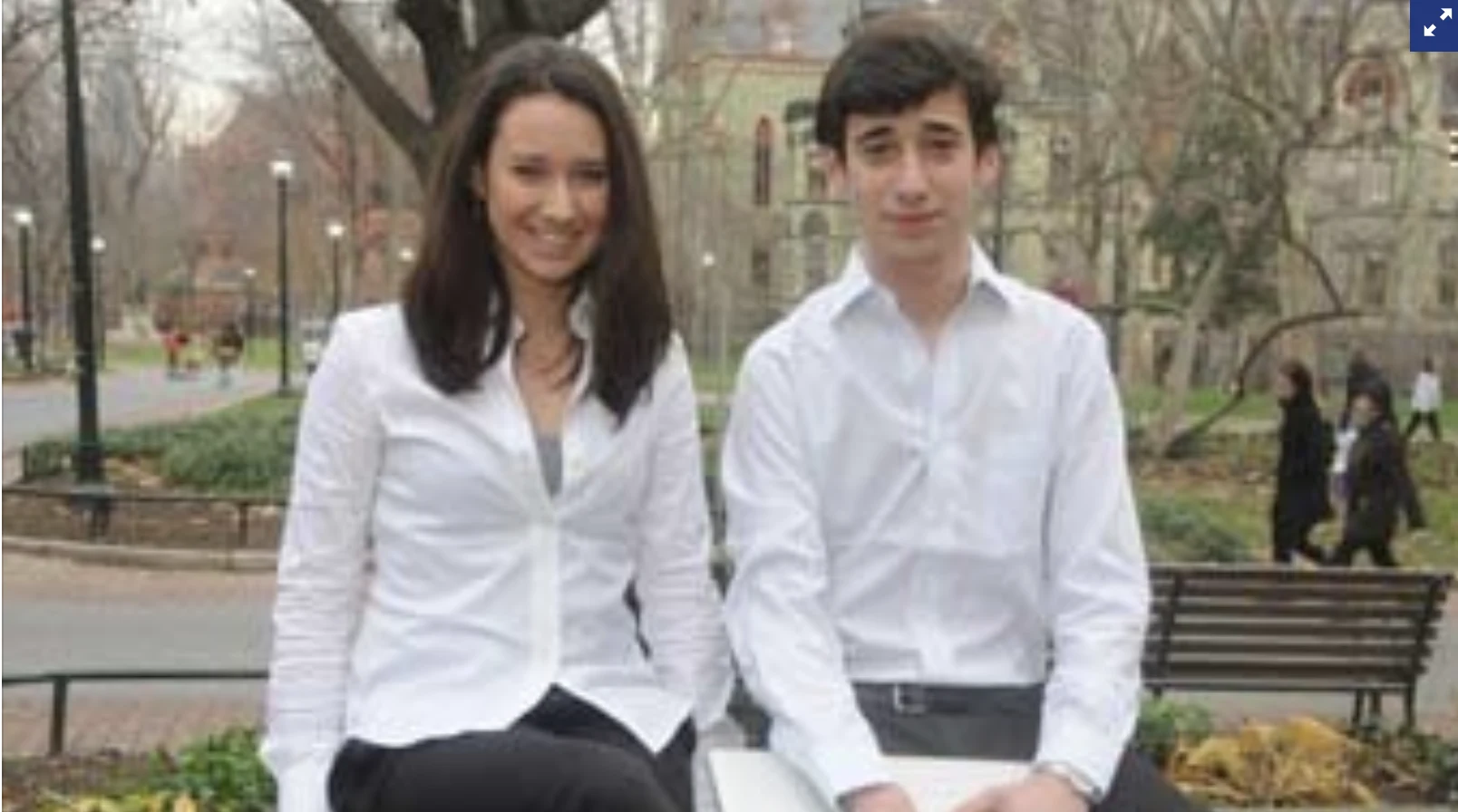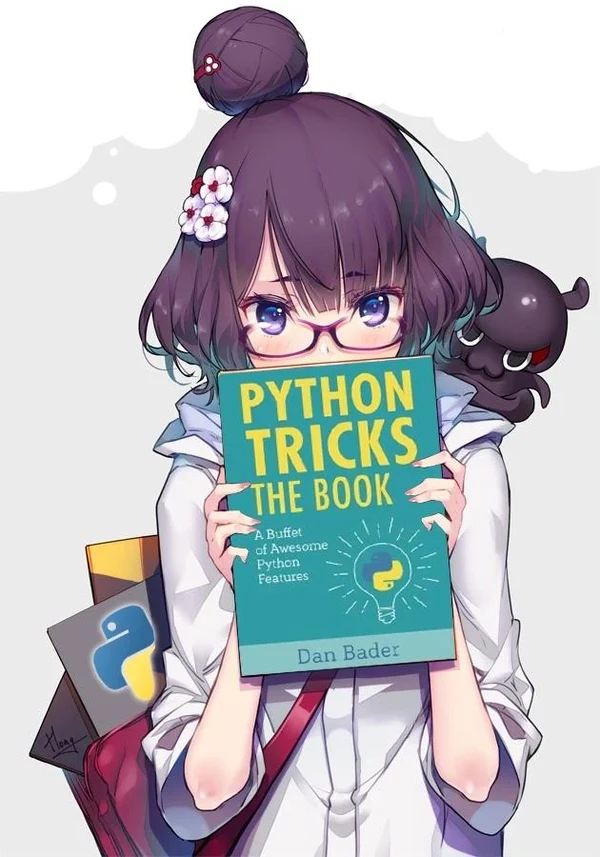No one noticed?

Highlights
"All Frank was doing was making it simpler to fill out standard federal financial aid paperwork" but she pretended it provided $28k in student loans 2x the national average
she filled their user database with 4 million fake emails/names
it took JPMorgan a year to noootice
"Despite a public record that raised questions about Javice and Frank — including warnings from the Department of Education and Federal Trade Commission, and a wage theft lawsuit from Frank's cofounder — news outlets and investors kept buying into the narrative that Javice spun."
arrested & facing up to 30yrs in prison
"Over and over, Javice earned plaudits in the media for projects whose impact she overstated. Glowing profiles missed inaccuracies that could have been caught with a basic fact-check, focusing instead on her youth and status as one of a small number of women startup founders. One journ*list even introduced Javice, then 19, to a key Frank investor."
Her background
^ Her with her brother @ 19
ambitious af: originally made a microfinance startup called PoverUp (yuck) in high school with her brother
told the media she raised $300k for the startup, but there's no proof
CNBC ran a bit about Peter Thiel's "paid to not go to college" grant, she appeared on the show claiming she turned the offer down, Peter Thiel emailed CNBC saying she was not even selected
still got her tons of press
"Fast Company's 2011 list of 100 Most Creative People and a complimentary writeup in Forbes. PoverUp was ranked as one of the "11 coolest college startups" by Inc. Magazine, while Wharton called Javice "the voice of a microfinance generation" in a video it has since removed from YouTube."
Startup number two
since PoverUp wasn't a real company and naturally died, she created another company with an
 Isreali called "tapd: a company that connected young workers with job opportunities via text message"
Isreali called "tapd: a company that connected young workers with job opportunities via text message"completely bombed, lost a few hundred k and ended up in a lawsuit w/ Isreali
 courts
courtsshe pivoted Tapd to an entirely new market that (surprise) turned out to be heavily regulated and she didn't do the research. Sold it as a "learning moment"
despite this
 Isreali dude joined her at Frank, before she jewed him out of 10% equity and failed to pay him salary, so he sued her
Isreali dude joined her at Frank, before she jewed him out of 10% equity and failed to pay him salary, so he sued her
That doesn't stop a girlboss though:
While the story of Tapd seemed to be one of failure and contentious mismanagement, Javice would spin that turmoil into a story of triumph. The young founder made the crisis part of her personal success story, omitting the lawsuit and framing the layoffs as a teaching moment
Media sucking her (girl) peepee
In 2018 NYTimes let her do an Op-ed:
https://www.nytimes.com/2017/12/19/opinion/fafsa-college-financial-aid.html
and was forced to follow it up with a long correction because apparently she didnt know shit about student aid
She got lots of local news:
The death blow:
Frank's public statements about its user base were all over the map.
In April 2017, Frank's website said "thousands" of families using its service had received "$75 million in free aid." (That same website had stock images of people, including of "smiling mature woman" and "good looking cheerful manager," labeled as actual users.)
In November 2018, Frank's website said it had helped 300,000 families unlock over $7 billion in aid.
Frank stuck with the "over 300,000" figure for more than two years. But suddenly, in January 2021, the company began claiming that it served "over 4.25 million students," according to archived versions of its website and tweets from Frank's account referenced in JP Morgan's lawsuit.
In reality, Frank only ever had about 250,000 users, according to JPMorgan's legal complaint.
Orange site discusses: https://news.ycombinator.com/item?id=35441211
(PDF) The JPMorgan complaint: https://content.fortune.com/wp-content/uploads/2023/01/Complaint-1.pdf






 girlboss arrested for selling company to JPMorgan for $175m pretending they had 4 million users when they only had 250k
girlboss arrested for selling company to JPMorgan for $175m pretending they had 4 million users when they only had 250k








Jump in the discussion.
No email address required.
Some article I glanced over (might even be the one you linked but I ain't reading any more ) said that she wouldn't share any specific information about the users due to privacy concerns and that's how she got JPM to buy it without ever knowing it was blatant fraud.
) said that she wouldn't share any specific information about the users due to privacy concerns and that's how she got JPM to buy it without ever knowing it was blatant fraud.
Jump in the discussion.
No email address required.
So is this a compulsive lying issue or what? How did she see this playing out? It's not like returning a vitamix box full of rocks to Amazon, at some point they were inevitably going to look closely at the software they bought.
Jump in the discussion.
No email address required.
Jump in the discussion.
No email address required.
More options
Context
Between this and wework and FTX and juicero and theranos, I'm convinced all conspiracies are fake. The billionaire elites have no idea what they're doing, it's r-slurs all the way up.
Jump in the discussion.
No email address required.
Juicero at least had a real working product. It was way overdesigned and underbuilt, but it at least did what it promised. The grift there was selling VC schmucks on the power of organic cold pressed juice as a service. In a way though it was weirdly prescient and with some retooling and a more realistic pricing scheme I think it might actually have legs now.
Jump in the discussion.
No email address required.
Honestly feels like juicero and peloton are the same product. There's a timeline where every aspiring SVcel has a saas juicer next to their daylight alarm clock, and peloton flopped to a chorus of jeering "exercise bikes already exist" articles. It's not like those investors in particular were stupid, all investments ultimately come down to "yeah I have a good feeling about this one, throw 9 figures at it".
Jump in the discussion.
No email address required.
Peloton's product is selling you the motivation to exercise. For customers who aren't intrinsically motivated, this requires a subscription service because you need to summon motivation from somewhere each time you exercise. I think it also has a bunch of "show off to your friends" features that allow it to be a status symbol in a way a juicer can't be.
Jump in the discussion.
No email address required.
Motivation is fleeting and only works in the beginning, you need discipline. And discipline is very alien to 21st century Americans.
Jump in the discussion.
No email address required.
More options
Context
More options
Context
any day now Imma set mine up!
Jump in the discussion.
No email address required.
More options
Context
More options
Context
Yeah if it had been half the cost and didn't have a subscription product that could be juiced by hand, it probably would still be around
Jump in the discussion.
No email address required.
More options
Context
More options
Context
it was. literally. a real company. with a real product.
Jump in the discussion.
No email address required.
More options
Context
Jump in the discussion.
No email address required.
More options
Context
More options
Context
Probably hoped to still be in charge after the buy out and eventually grow to that size with legit users, or that JPM would be too embarrassed to do anything about it.
Jump in the discussion.
No email address required.
More options
Context
Grindmaxxers live on "fake it til you make it" where you lie until your company actually takes off, and then you scrub your lies away. She probably thought that they would eventually have a working product and eventually have 4 million users. She just needed more money first, and their tracks could be covered for long enough to get there.
Jump in the discussion.
No email address required.
More options
Context
For the vast majority of fraudsters, the first person they fool is themselves. She probably genuinely didn't think she did anything wrong.
Jump in the discussion.
No email address required.
More options
Context
More options
Context
Yep, from the lawsuit:
She paid this prof $13k to make the list seem accurate.
Then JPMC tried to use this list (because why else buy the fricking company?):
Jump in the discussion.
No email address required.
lmao, this is why we need gdpr
Jump in the discussion.
No email address required.
Jump in the discussion.
No email address required.
More options
Context
More options
Context
More options
Context
More options
Context